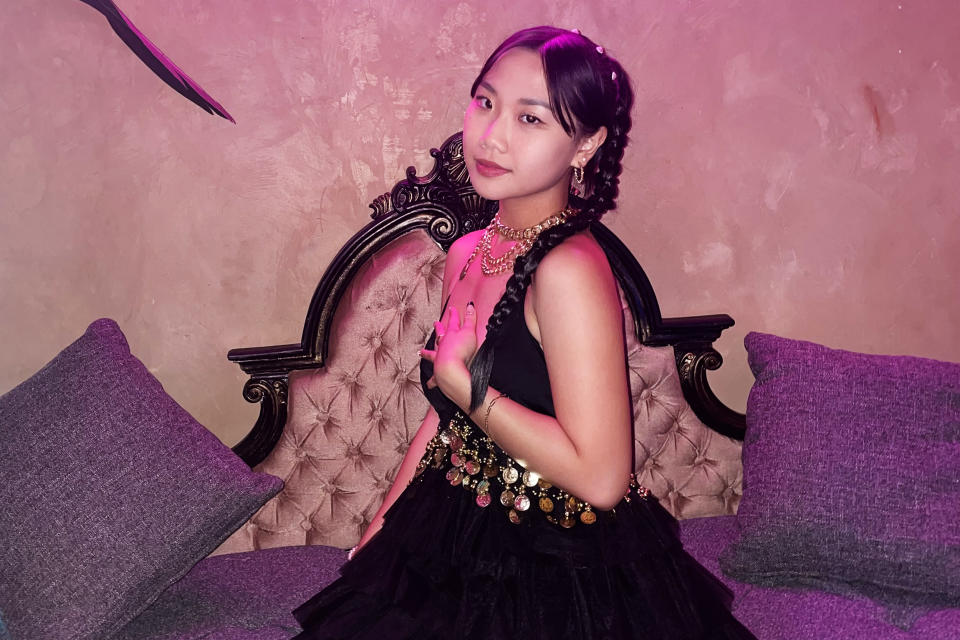Chinese Puerto Rican TikToker goes viral for explaining multicultural identity
As the only student of Asian descent at her high school in Puerto Rico, Keishla He was used to sticking out.
So when He — who is of Chinese descent and was born and raised in Puerto Rico — started posting on TikTok in Spanish, comments rolled in expressing surprise at her fluency in her native language. The 20-year-old began sharing more of her identity online and quickly drew an audience. Since her first videos in 2020, He has amassed more than 1.8 million followers.
“I know I’m not the only Asian that was born here in Puerto Rico and was raised here,” He told NBC Asian America. “So I wanted to be that person that they can look up to and say, ‘OK, I’m not the only one,’ so they don’t feel alone.”
She began posting at the start of the pandemic to speak out about the spike in racist language against Asian communities. But what garnered more attention, she said, was her fluency in Spanish. As those questions came in, He began posting more content in her native language and addressing commenters’ confusion.
Many of her videos involve He sharing anecdotes about her life, entertaining followers with her rapid storytelling and sense of humor. Oftentimes, she switches fluidly from Spanish to English to Cantonese, as she recounts conversations with strangers and family members.
For He, educating others usually doesn’t start with explicit conversations about her identity, but with embracing her heritage and responding to the continual flow of comments expressing shock or skepticism.
He’s TikToks are often flooded with support from other Boricuas who share her cultural pride and encourage her to embrace her background. But she’s also gotten some pushback.
“I started receiving a lot of hate saying that I should stop saying that I was Puerto Rican just because I was born here or raised here,” He said. “I was really confused. And that’s when I decided, since nobody’s talking about this, I decided to be the first one to talk about it, to be proud of my roots.”

Though the Chinese Boricua community makes up a small percentage of the island’s overall population, these Puerto Ricans have generations of history tying them to the territory. After the Chinese Exclusion Act passed in 1882, many Chinese in the continental United States fled to Puerto Rico and found work there.
These migrants contributed heavily to reconstructing the island’s infrastructure and rail transport systems after the Spanish-American War, which resulted in Spain ceding Puerto Rico to the U.S. in 1898. Many Chinese laborers had settled permanently there, but the U.S. soon extended the Exclusion Act to include this new territory — stunting further immigration until all of the country’s various exclusion laws against Chinese immigrants were repealed in 1943.
The U.S. Census reports people of Asian descent make up just 0.2 percent of Puerto Rico’s population. Like many Asian Americans across the country, He said the isolation she felt as a child — from being bullied for the shape of her eyes, her food or the language she spoke at home — at times pushed her to reject her Chinese identity.
But after years of trying to “be more Puerto Rican,” He said she wanted to embrace both cultures without shame.
So when she noticed a dearth of Asian Boricuas making content about their identities, she decided to fill that gap and help expose people to the diversity of Puerto Rican communities. Her parents had immigrated from China and started a restaurant on the island, He said, but they never spoke up about the prejudice they faced.
“I have the ability to speak up, so why shut my mouth when something is wrong?” she said. “Why not express my point of view to get other people to think?”
Spanish is He’s primary language, but she speaks Cantonese with family and learned English in school. Lately, the multilingual content creator has also been practicing Mandarin and picking up the basics of Korean, inspired by her love for Korean dramas.
K-dramas were a source of comfort for He as a child, she said, because of the minimal Asian representation she saw in mainstream Western entertainment. He, who is now in her second year of university, said her experiences growing up have taught her the importance of staying true to herself.
“Don’t be harsh on yourself and don’t be harsh on others,” He said. “I know that not having knowledge doesn’t excuse you from doing bad things, but give them a chance to learn.”

